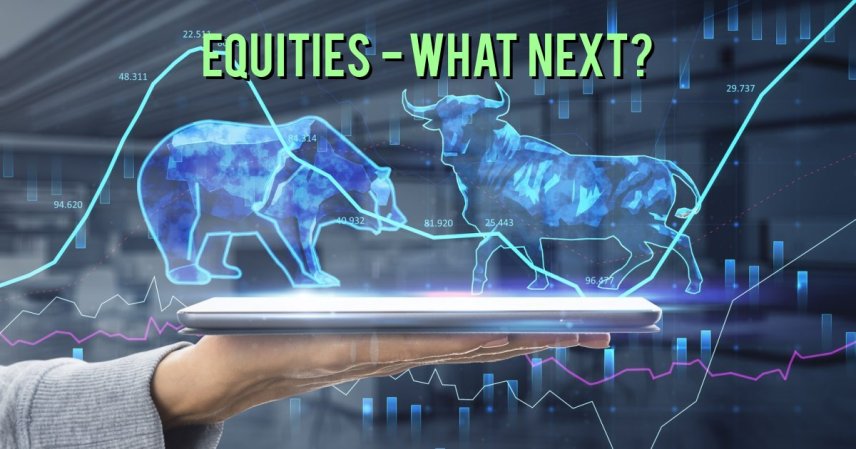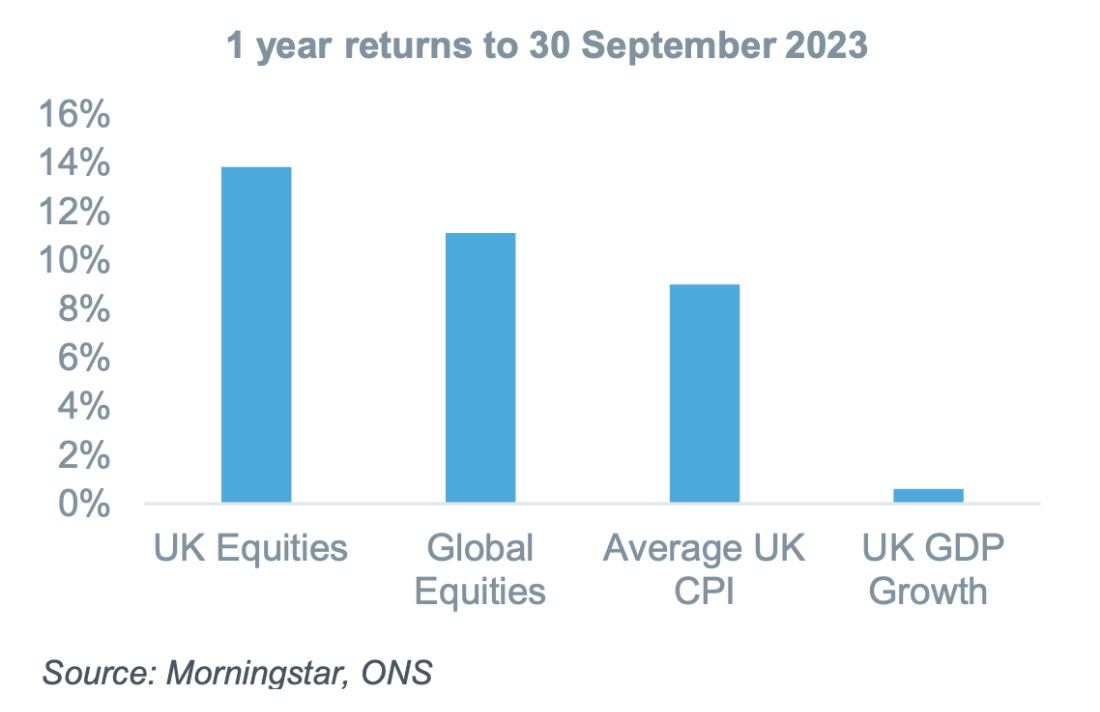
What is the outlook for equity markets?
What now for high risk portfolios?
Tuesday 21 November, 2023
-
Over much of the past year, we have seen notable divergence between the negative economic/geopolitical news in the media and the positive performance equity investors have experienced. This acts as a useful reminder that equity markets are forward looking, and decisions over whether to invest or divest should not be based on short-term focused news headlines.
-
Equities are a long-term investment, and the longer you can stay invested the more confident you should be in getting rewarded for investing in this asset class (Based on history, equities have outperformed cash 91% of the times when held for 10 years or longer).
-
Equities are also expected to outstrip inflation over the long-term, for example, if you invested £100 30 years ago, today, adjusting for inflation, it would be worth £432 if it was invested in the equity market, and would be just £131 if it remained as cash.
What we have seen recently in equity markets
Over much of the past year, there has been notable divergence between much of the negative economic and geopolitical news that we have seen in the media and the positive performance equity investors have experienced. For example, investors in UK and global equities have received a return of more than 11% over the year to 30 September 2023 (see figure 1), despite ongoing concerns over economic growth and high inflation.
Short-term market outlook for equities
Companies’ earnings growth expectations have remained relatively robust and global markets’ valuations (in aggregate) are broadly in line with historical averages, all of which can help provide some support to equity markets. Nevertheless, the ongoing uncertainty around stubborn inflation and higher for longer interest rates, will act as a headwind and has the potential to contribute to short-term market volatility.
Strong equity returns despite higher inflation

Looking longer-term
History has taught us that equities should perform strongly and outperform cash and bonds over the long-run. For this reason, within our high-risk portfolios, we see equities as the primary driver of returns over the long-term. We set out the reasons for this view below which you may wish to you use with your clients:
Equities get rewarded over the long-term
• Equities are a long-term investment, and the longer you can stay invested the more confident you should be in getting rewarded for taking the additional investment risk e.g. according to the Barclays 2022 Equity Gilt Study, over the long term equities have outperformed cash 91% of the time when held for 10 years or longer. Equities are also expected to outstrip inflation over the long-term, for example, if you invested £100 30 years ago, today, adjusting for inflation, it would be worth £432 if it was invested in the equity market, and would be just £131 if it remained as cash.
Equities offer investors global investment opportunities
• Equity markets are global in nature and provide access to a variety of countries (including emerging markets) and companies. There are currently 1,510 companies in the MSCI World index. Portfolios can gain exposure to a variety of different markets, increasing diversification and relying less on certain economic conditions to succeed.
Equities are not all the same and can be accessed cheaply
• Equities come in all shapes, sizes, and styles. HRIS, when building portfolios, seek to be well diversified by region, sector, and factor. Doing so offers us greater confidence in the predictability of our future returns. Equities are also relatively cheap to access, compared to many other asset classes, which helps give an efficient exposure to growth oriented assets.
Equity markets are forward looking
• Economic data releases reflect historic performance of an economy. In contrast, equity markets typically look forward, and often price in much of the anticipated economic data and newsflow as soon as it has been released, leading to a potential disconnect between newsflow and market returns. This means bad news is often already in the price, so while it maybe tempting to divest when short-term performance is challenged, it is important to focus on your long-term objectives, and remain invested.
Equity market volatility is normal, but it makes timing markets a challenge
• Equities are a risk asset and therefore short-term volatility should be expected. It is also worth noting volatility is driven often by macro-economic issues, rather than stocks' fundamentals, which can make precisely timing the most attractive entry and exit point of equity markets challenging. Given this, we have a preference to stay invested for the long-term and (where possible) any entries into and exits from the market being phased over a period of time.
The above points all reiterate why we believe equities should form the majority of any medium to higher risk portfolio. We have prepared various pieces of collateral which can support your discussions with clients, helping them keep up to date on markets and to overcome some of the behavioural challenges associated with investing in equities. One example looks at the FTSE All Share over 30 years showing how it has grown over time, despite a number of high-profile market related periods of stress.
Risk warning
This communication is issued and approved by Hymans Robertson Investment Services LLP. It is based on its understanding of events at the time of the relevant preparation and analysis. The information and opinions contained in this document are provided by HRIS and are subject to change without notice and should not be relied upon when making investment decisions. The value of your investments and the income from them may go down as well as up and neither is guaranteed. Investors could get back less than they invested. Past performance is not a reliable indicator of future results. Changes in exchange rates may have an adverse effect on the value of an investment. Changes in interest rates may also impact the value of fixed income investments. The value of your investment may be impacted if the issuers of underlying fixed income holdings default, or market perceptions of their credit risk change. There are additional risks associated with investments in emerging or developing markets. The information in this document does not constitute advice, nor a recommendation, and investment decisions should not be made on the basis of it. The material provided should not be released or otherwise disclosed to any third party without prior consent from HRIS.
Latest News Next Article Previous Article

